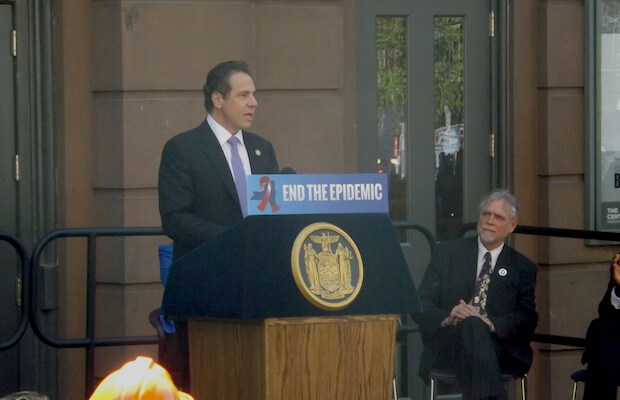President Donald Trump, House Speaker Paul Ryan, and other top Republicans in the Rose Garden shortly after the House voted to repeal Obamacare. | WHITEHOUSE.GOV
Even as Republican members of the House of Representatives jumped on a bus headed for a Rose Garden celebration of their Obamacare repeal vote — an event where President Donald Trump smirked before the cameras and then treated the GOP faithful to brewskies — LGBTQ health care and civil rights advocates joined other progressive groups in condemning the threatened dismantling of the Affordable Care Act.
Though Trumpcare, formally known as the American Health Care Act (AHCA), faces an uncertain future in the Senate, where moderate and some other Republicans are likely to have problems with the measure — particularly given concessions made in recent weeks to the House’s hard-right Freedom Caucus — the bill’s critics noted that what was passed on May 4 was an even harsher measure than the version that polled at only 17 percent earlier in the year. The measure passed by the House last week has not yet been “scored” by the Congressional Budget Office, but the AHCA, before the recent addition of more onerous provisions, was already estimated to throw 14 million Americans off their insurance by next year and 24 million by 2026.
Revisions to the original measure proposed in the House, which took the form of an amendment from New Jersey Representative Tom MacArthur, “takes a bad bill and makes it worse,” said Dr. Sean Cahill, director of health policy research at Fenway Health, an LGBTQ health clinic in Boston. “If enacted, it would make it much more difficult for people with pre-existing health conditions such as HIV to obtain health insurance that is affordable. It would also permit the sale of health insurance plans that do not provide coverage for preventive care, such as screenings for cancer and sexually transmitted diseases, or substance use treatment. This amendment seems designed to make it harder to obtain coverage for health care, not easier.”
As Republicans hold premature party, LGBTQ health advocates respond in anger
That statement from Cahill referred to several, but not all of the objectionable aspects of the Republican bill that Fenway and other LGBTQ health advocates have focused on.
The biggest complaint about the way the GOP measure became harsher over its legislative life involves the ability of states to opt out of the requirement of setting insurance premiums based on “community ratings” instead of “individual ratings.” If an insurance applicant is evaluated using an individual rating, their cost of insurance might become prohibitive if they have serious pre-existing conditions. The bar on health insurers charging higher rates for pre-existing conditions was one of the most popular features of Obamacare.
President Donald Trump, surrounded by top aides including Kellyanne Conway, Steve Bannon, Jared Kushner, and Ivanka Trump, watch as the House passes its Obamacare repeal on May 4. | DAN SCAVINO, JR./ WHITE HOUSE
In a written statement, Amida Care, a private nonprofit community health plan that offers health coverage and coordinated care for Medicaid members with chronic conditions, said, “The AHCA has the potential to take people living with chronic conditions like HIV back to the days when they were denied or could not afford health insurance coverage. Without regular, comprehensive health care, people with chronic conditions are hospitalized and visit the emergency room more frequently, require costly nursing homes, rack up high bills, and get pushed into poverty. Those burdensome costs are ultimately passed on to the government, insurers, and taxpayers.”
Trumpcare’s defenders argued that Americans with serious pre-existing conditions could access insurance through high-risk pools established by the states, and in response to the outcry over the issue the president threw in $8 billion in aid to support such pools at the state level. Health care experts agreed that was a fraction of what the need would be.
According to Amida Care, “High-risk pools have repeatedly failed to provide affordable, quality coverage for people living with HIV and other pre-existing or chronic conditions. Prior to the Affordable Care Act, 35 states had high-risk pools with waiting lists and inadequate coverage. Coverage in high-risk pools often has excessively high premiums, deductibles, and co-pays along with limitations on eligibility for needed drug coverage and care.”
Concern about pre-existing conditions was compounded by the AHCA’s allowing states to also opt out of a list of essential health benefits mandated for coverage. At particular risk is coverage for prescription medications, annual physicals, routine cancer screenings such as mammograms and colonoscopies as well as routine STD check-ups, substance abuse treatment, and mental health care.
“We see this vote as a direct attack on our clients, many of whom may lose their health insurance and their ability to access PrEP,” said Kelsey Louie, CEO of Gay Men’s Health Crisis. Along with other HIV/ AIDS service and advocacy groups, GMHC is aggressively promoting the use of pre-exposure prophylaxis by HIV-negative New Yorkers at risk of transmission as part of the state’s effort to effectively end the epidemic by 2020.
Trumpcare is particularly punitive in denying federal funding to Planned Parenthood. A statement from the Human Rights Campaign (HRC) noted Planned Parenthood’s role in providing both HIV testing and gender transition-related care, and it is also a critical provider of mammograms, Pap tests, and other cancer screenings for women, especially those from low-income areas and communities of color. The Government Accountability Office has estimated that almost 400,000 women would lose access to preventive care and another 650,000 would have their access reduced under such a funding cut-off.
Another aspect of the AHCA with potential dire consequences is the block grant approach the federal government will take toward Medicaid reimbursement. Under Obamacare, the federal government reimburses at least 50 percent of state Medicaid costs. By allocating Medicaid on a per capita basis instead, Medicaid expenditures are estimated to fall by $880 billion over 10 years, a 25 percent cut that will largely impact people with disabilities.
In a Gay City News op-ed last month, Doug Wirth, Amida Care’s CEO, pointed out that as Indiana governor, Vice President Mike Pence drew on provisions of Obamacare’s Medicaid expansion to battle a sudden epidemic of HIV transmission among injection drug users in one of the state’s counties – where state funding for Planned Parenthood had earlier been eliminated.
States that chose to participate in Obamacare’s Medicaid expansion saw dramatic reductions in the numbers of uninsured people. The Kaiser Family Foundation estimated that the percentage of people living with HIV on Medicaid increased from 36 to 42 percent, while the Center for American Progress found that in the 31 states and the District of Columbia that participate in Medicaid expansion, more than 385,000 low-income LGBTQ people became insured.
In addition to the damage Trumpcare could do to low-income Americans, many middle class people will also face higher premiums, with tax credit subsidies on insurance costs no longer based on income or the cost of insurance, but rather solely on age. And age would now become something of a pre-existing condition, with insurers authorized to charge older people up to five times the lowest rate, rather than the three times limit in Obamacare.
Tax credits are at particular risk for residents of New York and California, since such credits would not be available on policies that provide abortion services, which are mandated by both states.
When House Republicans succeeded in eking out a victory last week on the Obamacare repeal, many Democrats said the measure would be dead on arrival in the Senate, and, in fact, GOP Majority Leader Mitch McConnell immediately announced that his body would start from scratch on drafting a bill. An analysis published on Vox demonstrated how the Senate’s rules could make the task of that chamber finding common ground with the House even tougher. The whole Obamacare repeal effort has been predicated on getting it passed under what is called the budget reconciliation process — in which the Republican majority in the Senate would need only 51 votes, not a filibuster-proof 60. Vox spelled out how some elements that House Republicans threw into the AHCA could make the measure ineligible for the reconciliation procedures.
On the other hand, the Huffington Post this week published a report suggesting that the House Freedom Caucus could just see its way clear to accepting some modifications from the Senate.
For now, LGBTQ health advocates are not counting their chickens. Shortly after Trump’s election, Wendy Stark, executive director of the Callen-Lorde Community Health Center, a Chelsea-base LGBTQ health clinic, noting that Obamacare allowed the agency to help more than 4,000 clients become insured, said, “Interrupting or reversing these advances would be truly devastating to the health of our communities and to the healthcare system at large.”
In a statement last week, GMHC’s Louie said, “The US House of Representatives has made a terrible mistake in passing the American Health Care Act, a disastrous bill that puts millions of lives at risk…. We call on leaders in the US Senate to stop this dangerous bill from moving forward.”
David Stacy, the government affairs director at HRC, said, “Donald Trump and his allies in Congress are one step closer to ripping away care from millions of people, with a particularly devastating impact on low-income senior citizens, women, children, LGBTQ people, and people living with HIV… With people’s lives on the line, we urge the Senate to stop this madness and reject this harmful piece of legislation.”




































